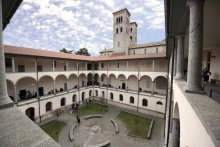The primary mission of the Department is to integrate scientific research with the needs of the Como and Varese areas.
Through an interdisciplinary approach, which constitutes its defining feature, the Department promotes the capacity to generate positive impacts on society, also thanks to the funding it has attracted from a range of bodies, including the MIUR, the Volta Foundation, the CARIPLO Foundation, the One Ocean Foundation and the Rothschild Foundation.
DiSUIT researchers are actively involved in national and international collaborations and research groups.
The research in the field of philosophical studies extends in several lines of investigation. In the field of Theoretical Philosophy major topical issues cover areas such as the philosophical implications of the possible discovery of extraterrestrial life and the role of science fiction in the perception of science. In the field of Aesthetics, research is conducted on the one hand in the area of Aesthetics in Social Languages, a field in which aesthetic reflection meets with art and philosophy; on the other hand, in the area of German-language Aesthetics with particular attention to the image. The departmental research also presents a line of research related to the pedagogical field, in which the study of methods and tools aimed at the design of educational experiences is accompanied by research aimed at the field of disability and specific educational needs.
The lines of research in this area aim to investigate the relationships between tectonics, magmatism and volcanism and deal with the study of the developmental habitat of animal and plant organisms and their relationships in natural situations.
The lines of research of these disciplines range from the historical aspects of law, in particular Roman law, to more current issues such as human rights, business organisation, corporate social responsibility and sustainability in the tourism sector.
The research lines of this area include several disciplines, which belong to two macro-areas, the linguistic, historical and literary studies related to the Italian language, and the studies of the European and extra-European languages that are that are represented at the Department. In the linguistic area, various lines of research focus on diachronic linguistics, synchronic linguistics, applied linguistics and philology.
In the literary area, the Department's research revolves around perspectives related to textual criticism and interpretation, literary history and comparative studies. Furthermore, there are studies on the theory and practice of literary and specialised translation and on language teaching.
Elena Valentina Maiolini, Gioele Cristofari
The lines of research of this field are mainly focused on the following fields: Big Data and models based on Artificial Intelligence and Machine Learning; numerical linear algebra and its applications in the study of techniques for solving linear systems arising from various integro-differential problems; the development of analytical procedures for the characterization of historical and artistic artifacts, as well as the design of innovative methods for restoration.
The field of Political and Social Sciences includes historical research lines that investigate political symbolism, with particular focus on the period of the French Revolution and the Jacobin period, in addition to research that investigates ideas and legal political institutions of the late Middle Ages.
Moreover, research in this field involves the reflection on individual rights and exercise of sovereignty in relation to the phenomenon of globalisation and the introduction of new technologies.
The field also includes sociological research.
The research in the historical field is chiefly concerned with the study of European history from the modern to the contemporary age. In the area of modernist studies, the study of social, intellectual and religious history is privileged, the latter being investigated especially with regard to Jewish-Christian relations. The contemporary area focuses on the transformation and persistence of elements of the Old Regime in the nineteenth and twentieth centuries on the one hand, and on the history of Europe in the context of global relations in the 20th and 21st centuries on the other, with particular attention to the role played by local authorities in the process of European integration. Moreover, in the field of historical sciences, there are studies in demoethnoanthropological disciplines concerning the anthropology of art and the art of Insulindia and Oceania. In this area research revolves around also photography in exoticism and primitivism in 20th-century art.
The area also includes research lines on the Middle East, Caucasus and Central Asia, as well as archaeological and archival research, and an history of science (biology in particular) that we might define as "activist" due to the historian's ambition to engage in dialogue with contemporary scientists.
The research in the field of Art History includes the period from the Middle Ages to the contemporary age, privileging the study of the Artists of the Lombard-Swiss Lakes, who were active not only locally, but also nationally, in Europe and overseas.
The research focuses on the study of territories, with particular attention to the relationships between space, power, and social practices.





